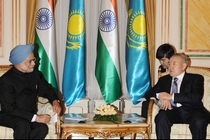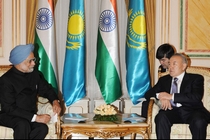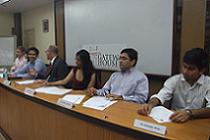The clock is ticking for the Assad regime
Former Indian Ambassador to Syria, Rajendra Abhyankar, speaks to Gateway House’s Samyukta Lakshman about the developments in Syria, the impact on India-Syria relations and the future of the region.
Former Indian Ambassador to Syria, Rajendra Abhyankar, speaks to Gateway House’s Samyukta Lakshman about the developments in Syria, the impact on India-Syria relations and the future of the region.
 Courtesy: Rex/WikimediaCommons
Courtesy: Rex/WikimediaCommons
While the fractious Indo-Bangladesh relationship has made progress over the past few months, both sides must engage in environmental diplomacy in the vulnerable Sundarbans region to ensure bilateral prosperity.
The Fukushima Daiichi nuclear disaster has sparked debate in the field of energy security all over the world. As Germany and Switzerland announce plans to phase out nuclear power, India's nuclear’s debate, and its looming water crisis, remains largely unopened.
In the global hunt for energy security, nuclear energy has grown increasingly relevant as countries struggle to find sustainable sources of energy. The ambitious plans to build the world’s biggest nuclear plant in Jaitapur may prove to be the litmus test that defines the role of nuclear energy in India's future.
 Courtesy: PMO
Courtesy: PMO
Indian Prime Minister Manmohan Singh met with Kazakh President Nazarbayev to strengthen ties and announced a Joint Action plan for 2011-14. Should the countries enhance their “arms-length transactional” relationship, a deeper alliance can be forged to include untapped sectors with immense potential
 Courtesy:
Courtesy:
The India-Kazakhstan relationship is in need of a massive overhaul. Manmohan Singh’s visit to Astana is full of possibilities that can transform the relationship from a short-sighted association into a broad-based, strategic, long-term one focusing on energy, security, trade and technology.
 Courtesy: UNPhoto/MarcoDormino
Courtesy: UNPhoto/MarcoDormino
A new United Nations doctrine is revolutionising the manner in which Western powers achieve regime change. Under the pretext of “Responsibility to Protect” –as the doctrine is named –armed intervention does not depend on the aspirations of a populace but the facilitation of existing power equations
 Courtesy: RahmEmanuael/Wikimedia
Courtesy: RahmEmanuael/Wikimedia
Japan’s Fukushima fallout puts the future of nuclear power in India in jeopardy. Our energy needs are so high that we will now need to consider all forms of energy - solar, wind, bio-mass, geo-thermal, oceanic energy, even energy through waves.
 Courtesy: CrethiPlethi/Flickr
Courtesy: CrethiPlethi/Flickr
As the Arab world reinvents itself in real time, the rest of the world must begin to understand the region as something more than a source for oil and a market for armaments and consumer goods.
 Courtesy: VirajSushiKarnik
Courtesy: VirajSushiKarnik
Highlights of the Indo-US Youth Dialogue